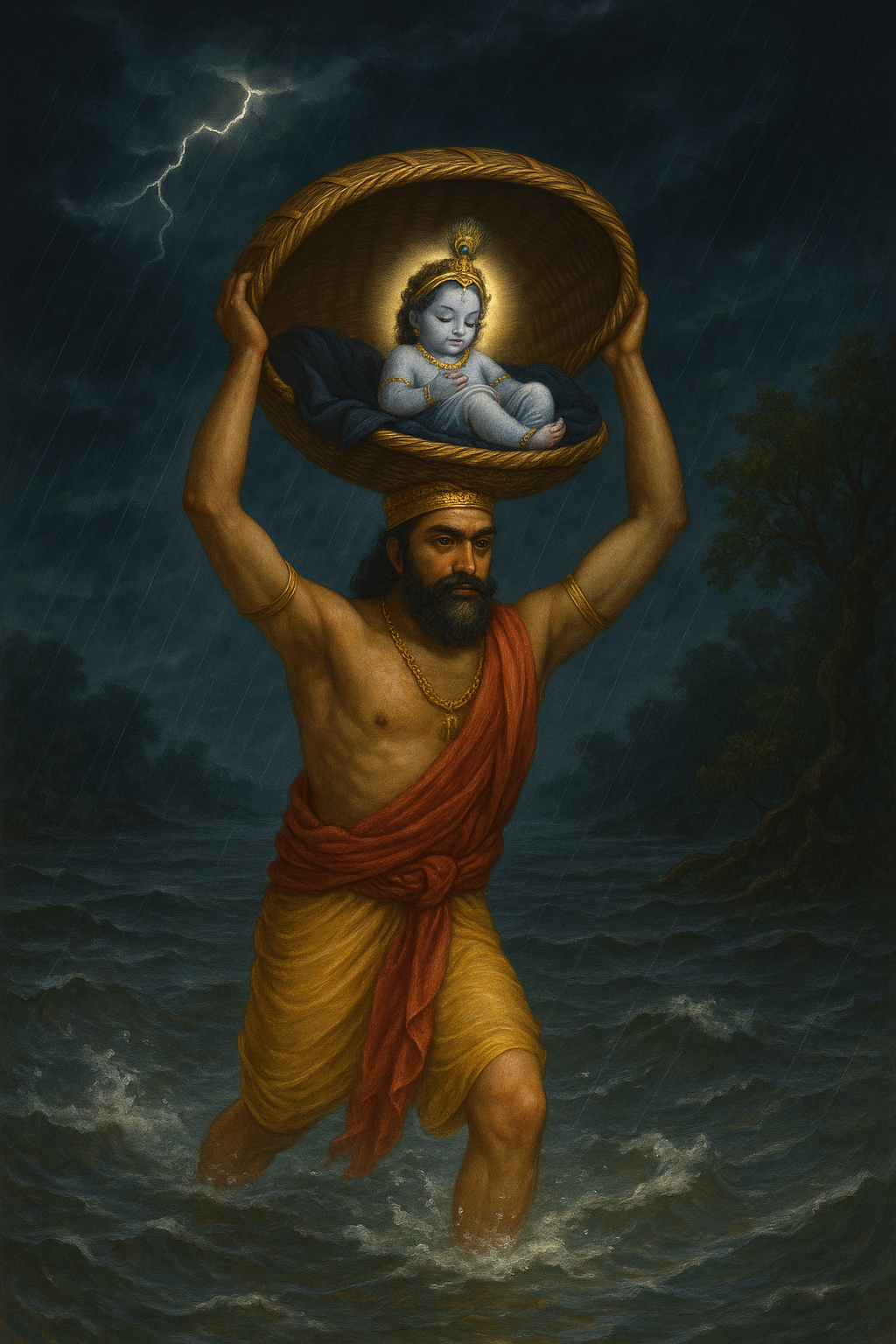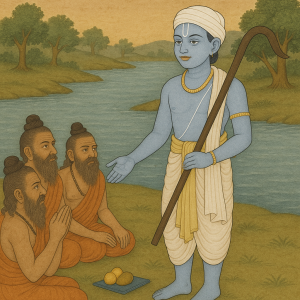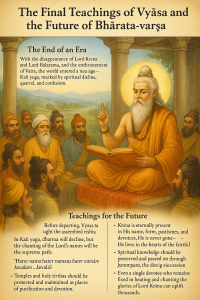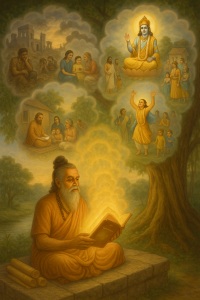The Tyranny of Kaṁsa
In the sacred city of Mathurā, capital of the Yādava kingdom, ruled King Ugrasena—a noble and dharmic monarch devoted to righteousness. But his son Kaṁsa, ambitious and possessed by demonic influences, overthrew him, seized the throne, and declared himself ruler. Thus, adharma took root even within the holy lineage of the Yādavas.
Though born into a royal family, Kaṁsa aligned himself with evil—persecuting sages, murdering righteous kings, and allying with asuras like Jarāsandha. Fearsome and paranoid, he ruled through cruelty and dread.
His sister Devakī was wed to Vasudeva, a noble and pure-hearted Yādava of the Śūrasena dynasty. But on the very day of their wedding, a divine voice resounded from the sky:
“O Kaṁsa! The eighth child born of Devakī shall be your death!”
Hearing this ominous prophecy, Kaṁsa, overcome by fear and wrath, drew his sword to kill his own sister. Vasudeva, calm and composed, intervened:
“Devakī is not your enemy. You have nothing to fear from her. I promise to deliver every child she bears into your hands.”
Kaṁsa agreed. True to his word, Vasudeva surrendered each newborn child. One after another, Kaṁsa mercilessly killed the first six infants, blinded by fear and delusion.
The Seventh Child – The Divine Transfer
When the seventh child was conceived, Lord Viṣṇu initiated a mystical arrangement. By His yoga-māyā potency, the child—Ananta Śeṣa, the divine serpent and expansion of the Lord—was transferred from Devakī’s womb to Rohiṇī’s, another wife of Vasudeva residing in Gokula under the protection of Nanda Mahārāja.
Thus, Balarāma was born safely in Gokula, to become the elder brother of Lord Kṛṣṇa.
The Birth of Lord Kṛṣṇa
When the time came for the birth of the eighth child, the entire universe seemed to hold its breath. Celestial beings prayed. Great sages meditated. Auspicious omens filled the heavens.
On the eighth day of the dark fortnight of the month of Bhādra, at midnight, inside the prison of Kaṁsa, the Supreme Lord Viṣṇu appeared in His original form—as Śrī Kṛṣṇa.
He manifested with four arms, adorned with the Kaustubha gem, yellow silken garments, and effulgence brighter than thousands of suns. Vasudeva and Devakī, beholding this divine form, were overwhelmed with awe and devotion. Folding their palms, they offered reverent prayers:
“O Supreme Lord! You are the eternal protector of the worlds. You have descended to relieve the burden of the earth and bless Your devotees.”
Hearing their prayers, the Lord gently smiled and spoke:
“Now I shall assume the form of an ordinary child. Take Me to Gokula, to the home of Nanda and Yaśodā. There, exchange Me with their newborn daughter.”
At that very moment, by the power of yoga-māyā, the prison doors opened silently, and the chains that bound Vasudeva fell away.
The Journey to Gokula
As storm clouds covered the sky and the Yamunā overflowed with divine excitement, Vasudeva placed the infant Kṛṣṇa in a basket, lifted it upon his head, and set out through the night. As he stepped into the Yamunā, the river miraculously parted, rising only to touch the feet of the Lord with reverence.
In Gokula, Yaśodā-devī had just given birth to a divine daughter—Yogamāyā incarnate. Both parents were fast asleep under the influence of divine slumber.
Vasudeva exchanged the babies and returned unnoticed. As he re-entered the prison, the doors closed, and the shackles returned—just as before.
Kaṁsa’s Futile Rage
At dawn, hearing the infant’s cry, Kaṁsa stormed into the prison. Grabbing the child from Devakī, he raised her to dash her against a stone. But the divine girl slipped from his hands and flew into the sky, assuming her celestial form as Durgā, the empowered energy of the Lord.
With a thunderous voice, she declared:
“O fool! The one destined to kill you has already been born elsewhere. You cannot escape your fate!”
Kaṁsa stood frozen with fear. Haunted by the prophecy, he unleashed a reign of terror, sending demons like Pūtanā, Aghāsura, and Tṛṇāvarta to kill the unknown child.
But none could touch the Lord. One by one, they would fall, defeated by the divine child who now lived, protected and cherished, in the peaceful village of Gokula.
There, in the loving care of Nanda Mahārāja and Yaśodā-devī, the Supreme Lord Kṛṣṇa began His childhood pastimes—sweet, enchanting, and full of divine purpose.
Lessons to Be Learned
- Divine protection is assured to those who surrender to the Lord, as seen in the unwavering faith of Vasudeva and Devakī.
- Even a prison becomes sacred when the Lord appears there. His presence transforms suffering into sanctity.
- The Lord’s appearance is not random, but perfectly timed and divinely orchestrated for the protection of dharma and devotees.
- Kaṁsa’s fate shows the destiny of the ego, which resists the Lord out of fear. It is eventually destroyed by the very Truth it opposes.
- The Lord conceals His divinity behind the veil of human-like pastimes, testing our hearts—whether we see only a child or recognize the Supreme.
- Bhakti (devotion) dispels fear. When Kṛṣṇa is with us, no power—demonic or worldly—can overcome us.
Origin of the Story:
Harivaṁśa Purāṇa – Viṣṇu-parva, Chapters 6–13; Śrīmad-Bhāgavatam (10.1–10.3)



